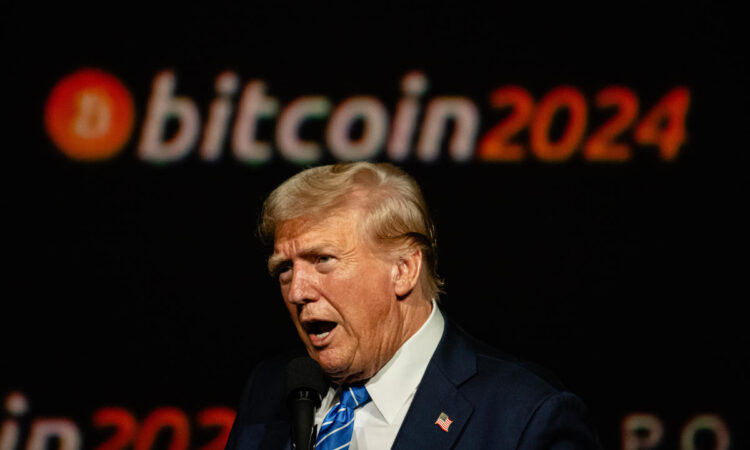
Bitcoin surged to its highest level in six weeks, trading close to the $70,000 mark on Monday, following former US president Donald Trump’s renewed endorsement of cryptocurrency over the weekend.
The world’s largest cryptocurrency was valued at $69,495 (£54,254) at the time of writing, a 2.9% increase.
Trump was the keynote speaker at Bitcoin 2024 on Saturday, a gathering of industry heavyweights in Nashville, Tennessee. The Republican presidential candidate used the event to court voters and encourage campaign donations from the tech community.
Trump declared his intention to make the US the “cryptocurrency capital of the world” if re-elected. He assured the crowd that he would retain 100% of the bitcoin that the US government currently holds or acquires, proposing the creation of a “national bitcoin stockpile.”
Additionally, Trump announced plans to “immediately appoint a bitcoin and crypto presidential advisory council,” further solidifying his support for the industry. He also vowed to fire SEC chair Gary Gensler if elected.
Read more: Stocks to watch this week: Meta, Apple, Amazon and also UK interest rates
“I think you’re just in your infancy,” Trump told the meeting of crypto industry leaders. “I can see it happening. In just 15 years, bitcoin has gone from merely an idea posted anonymously on an internet message board to being the ninth most valuable asset anywhere in the world.”
Trump’s recent statements mark a significant shift from his 2021 comments, when he labelled bitcoin a “scam” detrimental to the value of the US dollar.
Alibaba (BABA)
Shares of Alibaba experienced their most significant rise in two months as investors welcomed the company’s new strategy to generate more service fees from merchants.
The e-commerce giant’s stock climbed up to 5.8% in Hong Kong following the announcement that Alibaba will introduce a basic software service fee of 0.6% on confirmed transactions for vendors on its Tmall and Taobao platforms.
According to an insider quoted by Bloomberg, the policy change was communicated to merchants on Friday. However, there may be exemptions for smaller vendors, the source added.
Jefferies Financial Group highlighted that this new measure is expected to enhance Alibaba’s core merchant revenue, joining other positive catalysts for the stock. Currently, Alibaba generates most of its revenue from Taobao and Tmall through customer management fees, which merchants pay for advertising and optimizing their product offerings.
Read more: Stocks that are trending today
Jefferies analysts, led by Thomas Chong, expressed optimism in a research note on Sunday: “We view the 0.6% software service fees starting in September as positive to core merchant revenue considering the new arrangement applies to both Taobao and Tmall.”
Alibaba’s transition to a percentage-based fee structure, initially reported by local media outlet LatePost, marks the company as the last major e-commerce platform to adopt this model. PDD Holdings(PDD) has been charging merchants a technical service fee of approximately 0.6%-1% of gross merchandise value since 2020, while JD.com (JD) and ByteDance implemented a 0.6% fee rate last year.
Heineken shares tumbled on Monday morning after the brewing giant missed profit growth expectations for its performance in the first half of the year.
The company swung to a first-half net loss of €95m (£80.3m, $103.1m) from a €1.16bn profit a year earlier, after writing down the value of its stake in Chinese brewer China Resources Beer (0291.HK), resulting in a hefty impairment.
Heineken announced a one-off impairment charge of €874m (£737.5m) after devaluing its stake in China’s largest brewer.
The Dutch beer company attributed the writedown to concerns about demand levels in mainland China. This significant impairment has led Heineken, the world’s second-largest brewer, to narrow its forecast for full-year operating profit to a range of 4% to 8%.
Read more: FTSE 100 LIVE: European markets higher as UK government gears up for cuts
Operating profit showed organic growth of 12.5%, below a company-compiled consensus forecast of 13.2%. Beer sales, which were expected to grow at 3.4%, rose by just 2.1%.
“Heineken gathered momentum following optimistic comments at a recent conference leading the market (and ourselves) to improve estimates,” Barclays analysts said in a Monday note.
“However, these results missed forecasts, suggesting there was a gap between the company’s messaging and analyst expectations. This needs to close.”
Educational publisher Pearson has reported a dip in sales for the past six months but announced plans to leverage advances in artificial intelligence (AI) to drive future growth.
The FTSE 100 (^FTSE) company informed shareholders of a slight increase in profits for the period, citing a “solid” performance in the first half of 2024 and “operational progress” across its business segments.
Pearson reported that sales fell to £1.75bn for the half-year ending 30 June, down from £1.88bn in the same period the previous year. However, the company’s assessment and qualifications division saw a 2% increase in sales for the half-year. In contrast, its virtual schools business experienced a 1% drop due to contract losses, and higher education sales declined by 2%. On a positive note, Pearson benefited from an 11% increase in English Language learning sales.
The firm also revealed that adjusted operating profits grew by 4% to £250m for the period.
Despite the sales decline, Pearson maintained its sales and profit guidance for the year
Chief executive Omar Abbosh said: “Significant demographic shifts and rapid advances in AI will be important drivers of growth in education and work over the coming years, and this plays to Pearson’s strengths as a trusted provider of learning and assessment services.
“We are implementing plans across all of our businesses that will see us deliver better products and services with greater efficiency. We’re also focusing on opportunities to progressively build our presence in materially larger and higher growth markets in which we are well positioned to succeed, with a particular focus on early careers and enterprise skilling.”
Download the Yahoo Finance app, available for Apple and Android.






